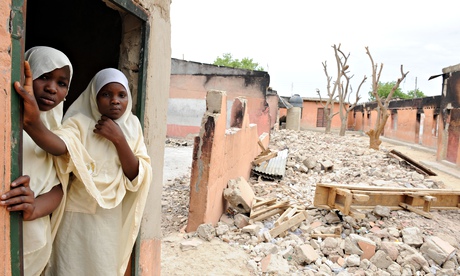Boko Haram kidnaps more women near Chibok, reports say

Suspected Boko Haram gunmen have reportedly kidnapped 20 women from a nomadic settlement in north-east Nigeria near the town of Chibok, where the Islamic militants abducted nearly 300 girls in April, most of whom are still missing.
Alhaji Tar, a member of one of the vigilante groups set up to resist Boko Haram's attacks, said the men arrived in Garkin Fulani at midday on Thursday and forced the women to enter their vehicles at gunpoint.
The group also kidnapped three young men who tried to stop the abduction, and drove to an unknown location in the remote stretch of Borno state, he said.
News of the latest kidnapping came as the people of Maiduguri buried more than 100 bodies almost a week after a Boko Haram attack. Local leaders said many more victims of the attacks had yet to be found.
Lawan Abba Kaka and John Gulla, from Attagara in Borno state, said nearly 110 people had now been interred after Islamist militants stormed the village and at least three others nearby on Tuesday and Wednesday last week.
Boko Haram, which wants to set up an Islamic state in Nigeria, has increased the number of attacks in recent months, with civilians bearing the brunt of the violence.
Ali Ndume, who represents Borno South in Nigeria's senate, said burials had taken place in nine villages: 42 in Attagara, 24 in Aganjara and 20 in Agapalwa.
"From what those who fled told us, there are more corpses in nearby bushes and the mountainside," he told reporters after a meeting in the Borno state capital of Maiduguri. "Many people that fled the communities are also trapped on the hills, as they are without food or water."
Hundreds of people were feared dead in the attack in the Gwoza district of Borno, with some community leaders putting the death toll as high as 500, although there was no independent verification of the claim.
Peter Biye, who represents Gwoza in Nigeria's lower chamber of parliament, last week described the bloodshed as massive, but said an exact death toll was impossible to compile because the insurgents were still in the area and local people had fled.
Heavily armed gunmen were said to have killed babies being carried on their mothers' backs and shot down villagers as they tried to flee.
Asabe Vilita, a Gwoza local government leader who is also Borno commissioner for commerce and investment, said 1,290 people were displaced by the violence and many had gone to Maiduguri. Three camps have been set up and local political and religious leaders in the affected areas were working with the military to ensure that those who fled could return when it was safe.
The villages were a mix of Christian and Muslim communities and Ndume said they had lived together peacefully for a long time.
"They may have their disagreements, but the latest attacks were perpetrated by Boko Haram. It is sad because our people were mercilessly murdered and many houses razed," he said.


